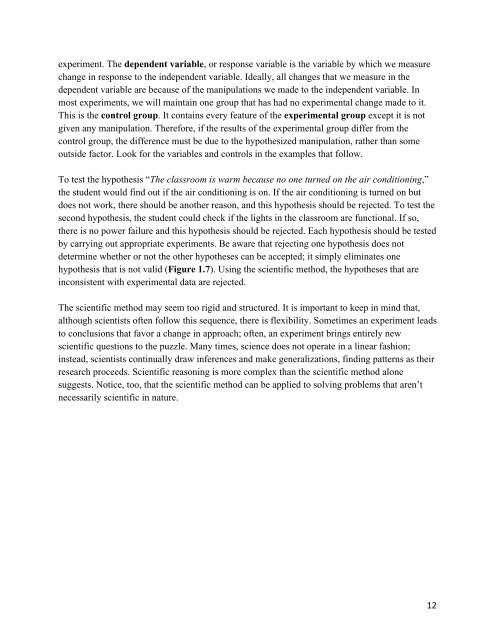Introduction to Environmental Science, 2nd Edition, 2018a
Introduction to Environmental Science, 2nd Edition, 2018a
Introduction to Environmental Science, 2nd Edition, 2018a
You also want an ePaper? Increase the reach of your titles
YUMPU automatically turns print PDFs into web optimized ePapers that Google loves.
experiment. The dependent variable, or response variable is the variable by which we measure<br />
change in response <strong>to</strong> the independent variable. Ideally, all changes that we measure in the<br />
dependent variable are because of the manipulations we made <strong>to</strong> the independent variable. In<br />
most experiments, we will maintain one group that has had no experimental change made <strong>to</strong> it.<br />
This is the control group. It contains every feature of the experimental group except it is not<br />
given any manipulation. Therefore, if the results of the experimental group differ from the<br />
control group, the difference must be due <strong>to</strong> the hypothesized manipulation, rather than some<br />
outside fac<strong>to</strong>r. Look for the variables and controls in the examples that follow.<br />
To test the hypothesis “The classroom is warm because no one turned on the air conditioning,”<br />
the student would find out if the air conditioning is on. If the air conditioning is turned on but<br />
does not work, there should be another reason, and this hypothesis should be rejected. To test the<br />
second hypothesis, the student could check if the lights in the classroom are functional. If so,<br />
there is no power failure and this hypothesis should be rejected. Each hypothesis should be tested<br />
by carrying out appropriate experiments. Be aware that rejecting one hypothesis does not<br />
determine whether or not the other hypotheses can be accepted; it simply eliminates one<br />
hypothesis that is not valid (Figure 1.7). Using the scientific method, the hypotheses that are<br />
inconsistent with experimental data are rejected.<br />
The scientific method may seem <strong>to</strong>o rigid and structured. It is important <strong>to</strong> keep in mind that,<br />
although scientists often follow this sequence, there is flexibility. Sometimes an experiment leads<br />
<strong>to</strong> conclusions that favor a change in approach; often, an experiment brings entirely new<br />
scientific questions <strong>to</strong> the puzzle. Many times, science does not operate in a linear fashion;<br />
instead, scientists continually draw inferences and make generalizations, finding patterns as their<br />
research proceeds. Scientific reasoning is more complex than the scientific method alone<br />
suggests. Notice, <strong>to</strong>o, that the scientific method can be applied <strong>to</strong> solving problems that aren’t<br />
necessarily scientific in nature.


















